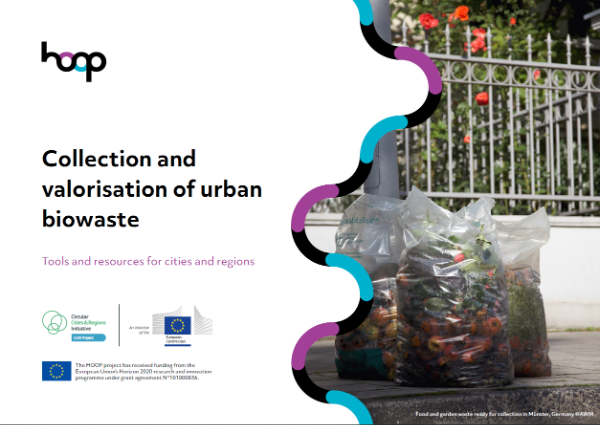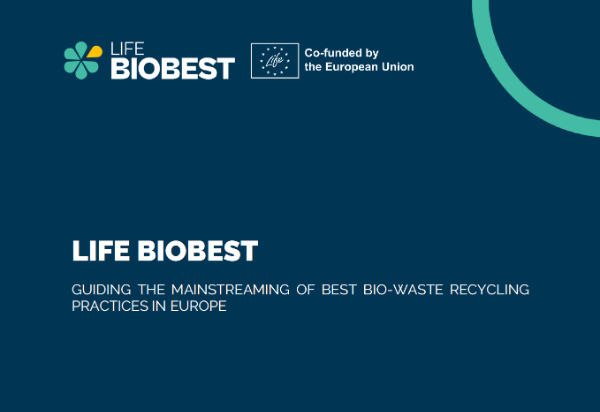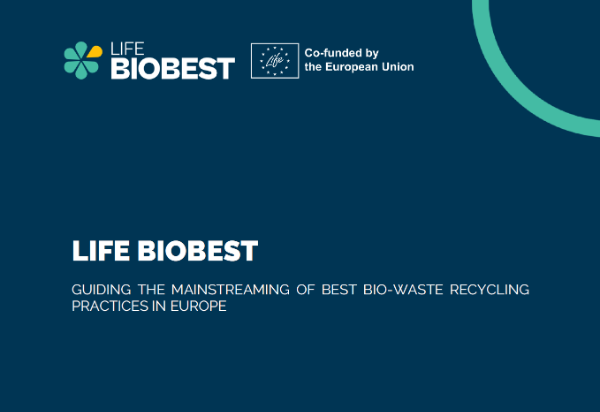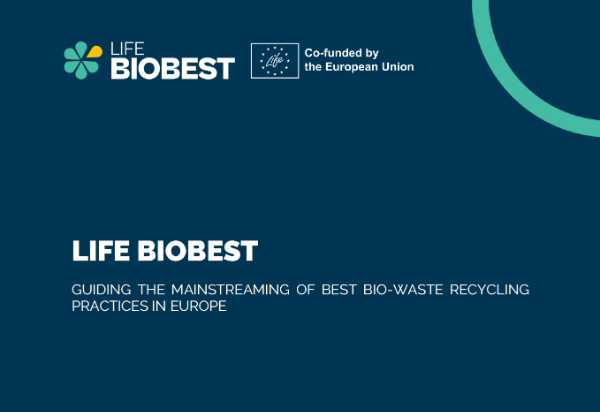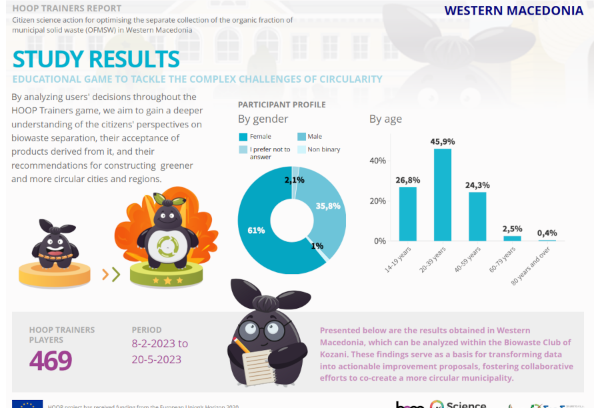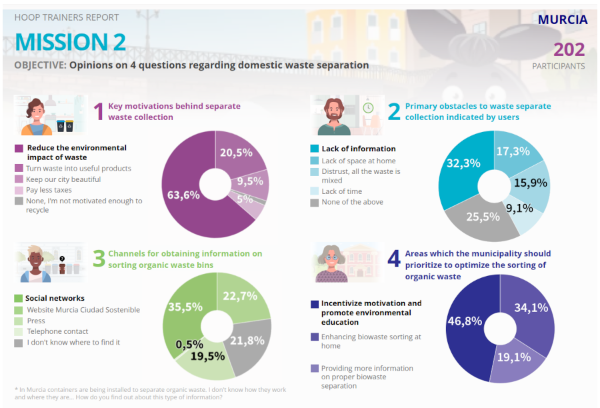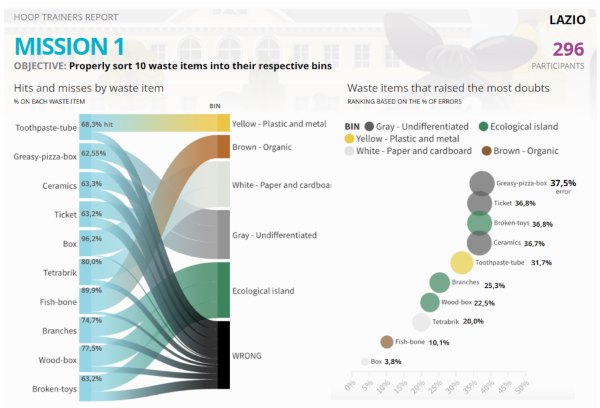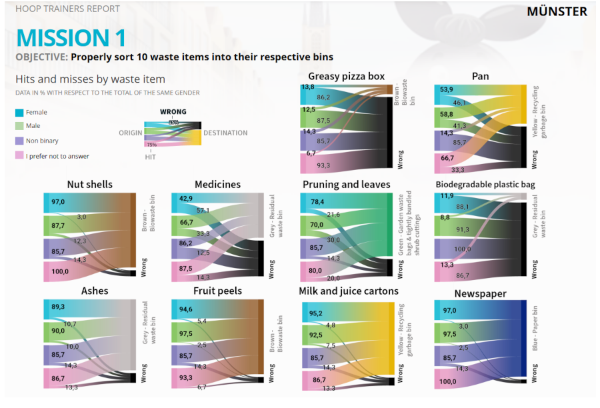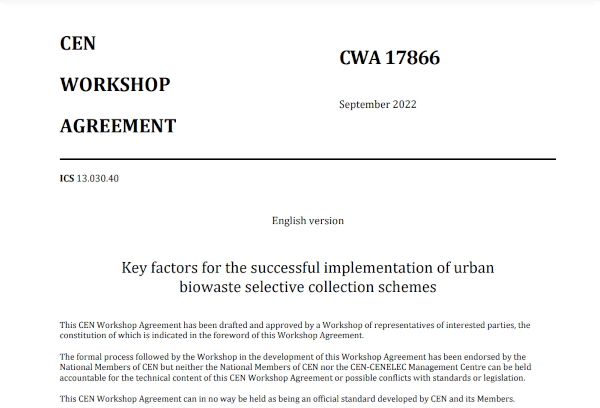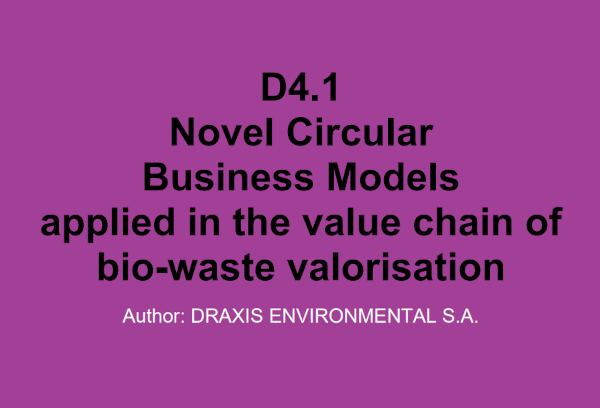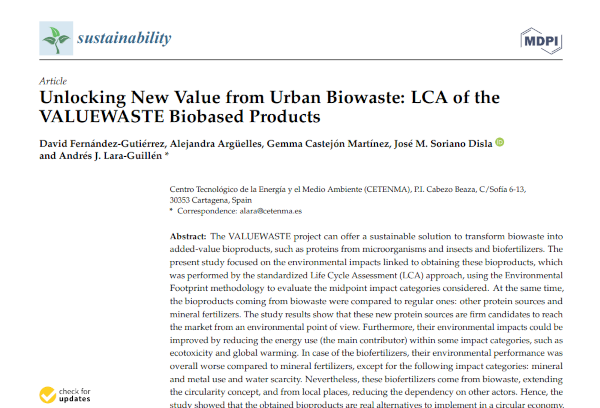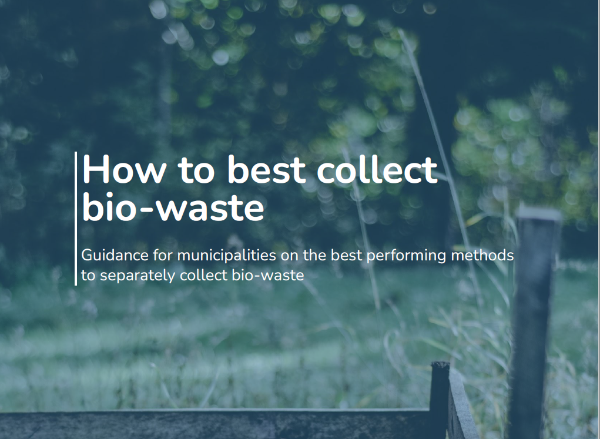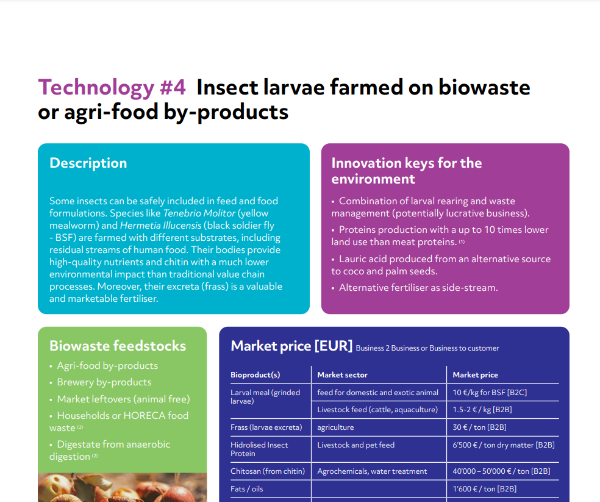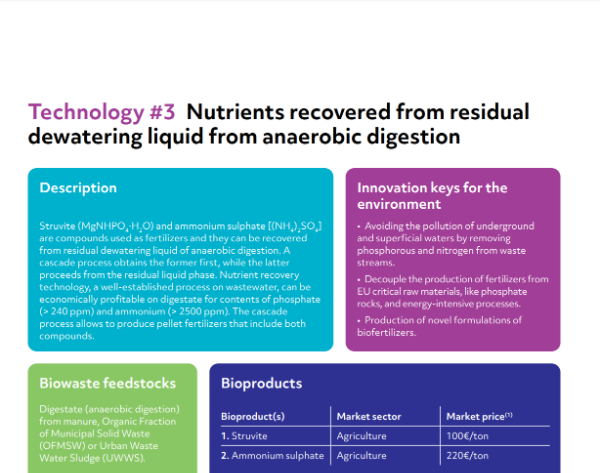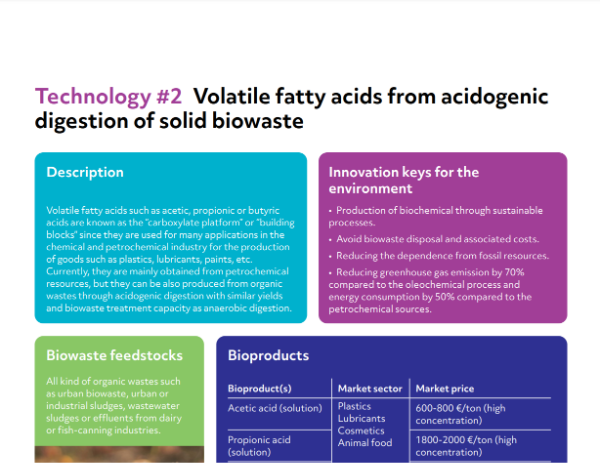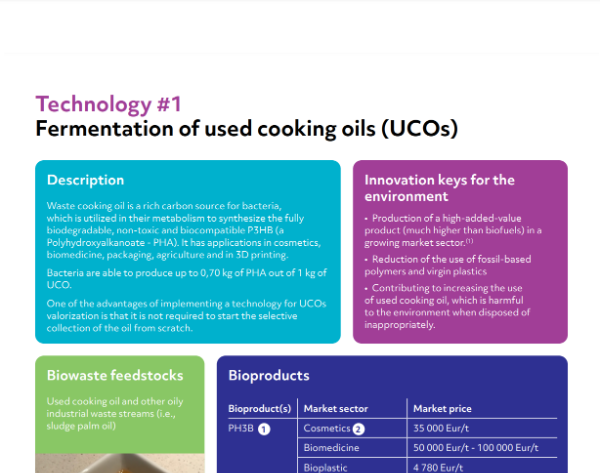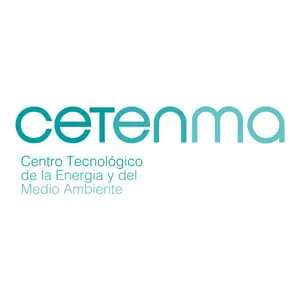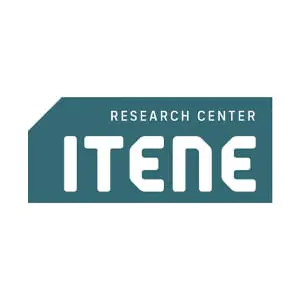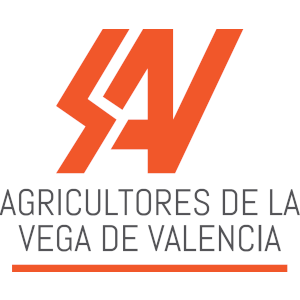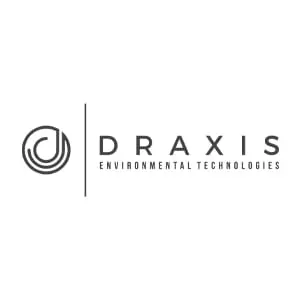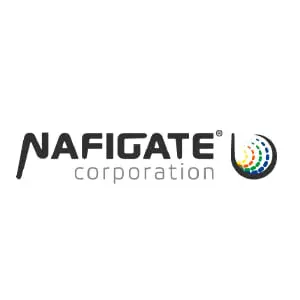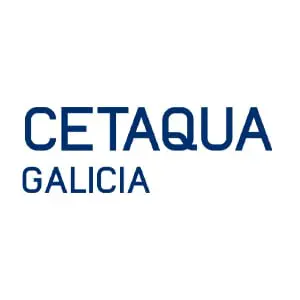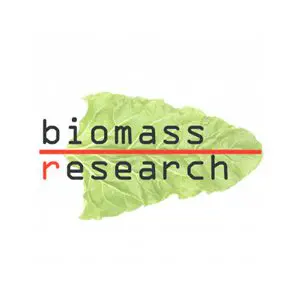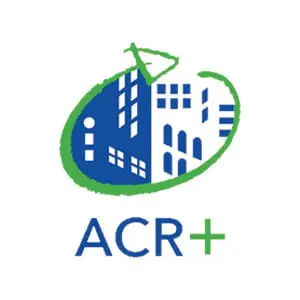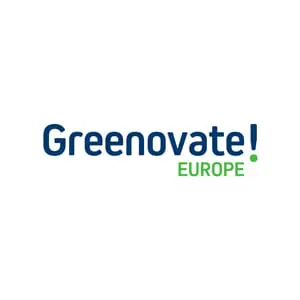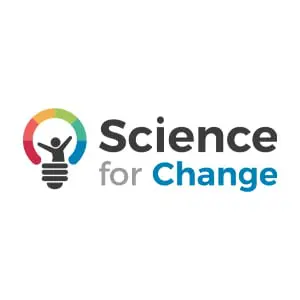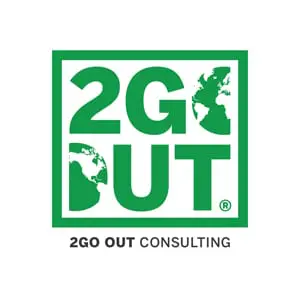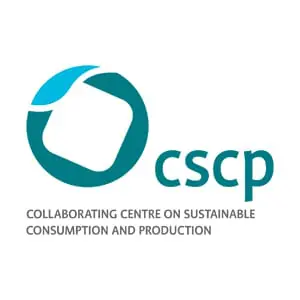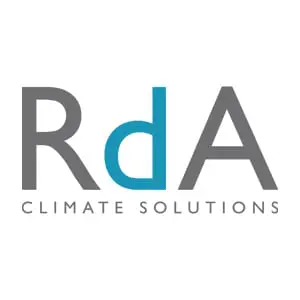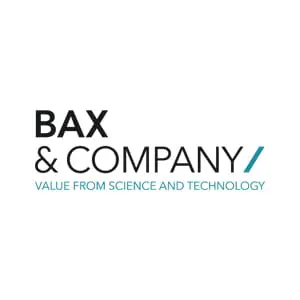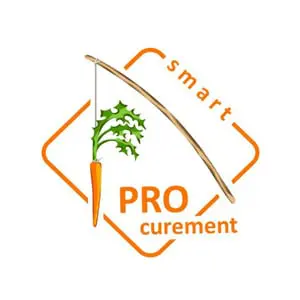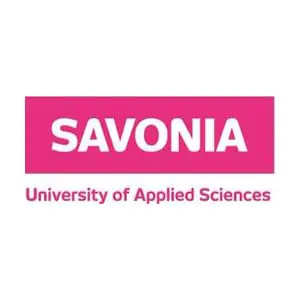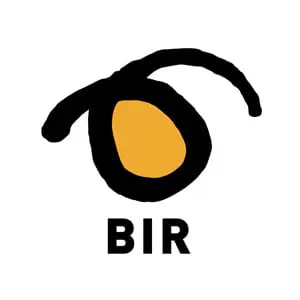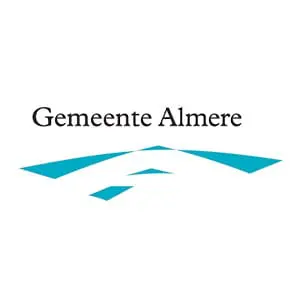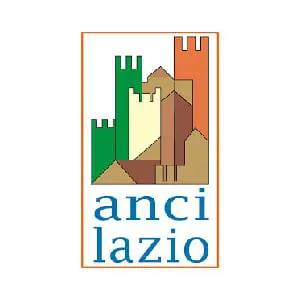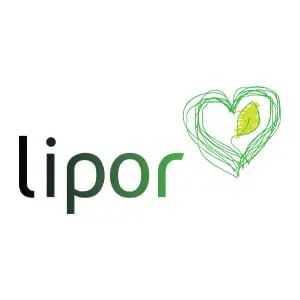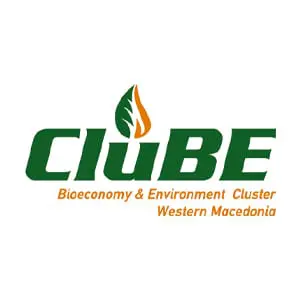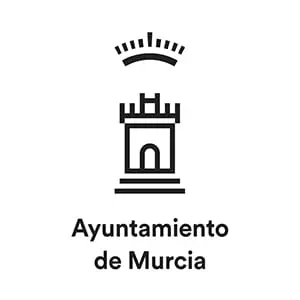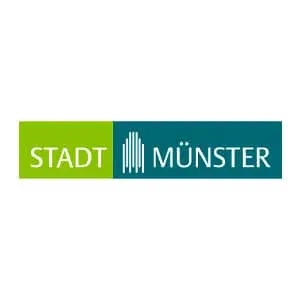Collection and valorisation of urban biowaste: Tools and resources for cities and regions
Biowaste (i.e. food and garden waste) is a key waste stream in the transition towards a circular economy. This manual provides tools and resources for cities and regions looking to better collect and valorise biowaste.
Circular strategies, Collection, Households, Incentives, OFMSW, Pilot projects, Pretreatment, Sorting, Valorisation technologies, Wastewater
Download pdf
LIFE BIOBEST Guideline to promote quality compost and digestate
The guideline focusses on the material recycling of bio-waste, aiming at supporting the set-up of processes for the production of high-quality compost and digestate and introduces the current EU framework and the ECN quality assurance scheme.
Collection, OFMSW, Valorisation technologies
Download pdf
LIFE BIOBEST Guideline on the separate collection of bio-waste
This guideline aims at summarising the key aspects that have to be considered when implementing a separate collection scheme for bio-waste and, in particular, for kitchen waste.
Collection, Households, OFMSW
Download pdf
LIFE BIOBEST Best Practice cases on bio-waste collection
A set of best practices cases from different EU Member States and for a range of regional, urban or rural settlements is presented in this document.
Collection, Households, OFMSW, Sorting
Download pdf
Urban Circular Bioeconomy Webinar Series 2 | Collection and Valorisation of Urban Biowaste
Learn about cutting-edge technologies for bio-product production from biowaste and wastewater, from municipal representatives implementing innovative technologies in their territories: Elisa Gambuzzi, CETENMA, and Dr. Christoph Baumann, awm Abfallwirtschaftsbetriebe Münster.
Circular strategies, Collection, Urban metabolism, Valorisation technologies, Wastewater
See Video
HOOP Trainers Report: Western Macedonia Region outcomes
Study Results of a Citizen Science program applied in the region of Western Macedonia to gain a deeper understanding of the citizens’ perspectives on biowaste separation, their acceptance of products derived from it, and their proposals for building a more circular region.
Behaviour change, Citizen awareness, Citizen science
Download pdf
HOOP Trainers Report: outcomes obtained in Murcia
Study Results of a Citizen Science program applied in Murcia to gain a deeper understanding of the citizens’ perspectives on biowaste separation, their acceptance of products derived from it, and their proposals for building a more circular city.
Behaviour change, Citizen awareness, Citizen science
Download pdf
HOOP Trainers Report: Region of Lazio outcomes
Study Results of a Citizen Science program applied in the Region of Lazio to gain a deeper understanding of the citizens’ perspectives on biowaste separation, their acceptance of products derived from it, and their proposals for building a more circular region.
Behaviour change, Circular strategies, Citizen awareness
Download pdf
HOOP Trainers Report: outcomes obtained in Münster
Study Results of a Citizen Science program applied in Münster to gain a deeper understanding of the citizens’ perspectives on biowaste separation, their acceptance of products derived from it, and their proposals for building a more circular region.
Behaviour change, Citizen awareness, Citizen science
Download pdf
SCALIBUR Project - Best practices for biowaste management
The SCALIBUR Project collected best practices on different topic related to biowaste management: among them, collection, transport, and social awareness.
Circular strategies, Citizen awareness, Collection, Consumer acceptance, Stakeholder engagement, Valorisation technologies
Download pdf
Key factors for the successful implementation of urban biowaste selective collection schemes
This agreement provides guidance for the implementation of biowaste selective collection schemes, and paves the way to increase citizen engagement, as this is crucial for the successful implementation of urban biowaste selective collection schemes.
Citizen awareness, Collection, Stakeholder engagement, Valorisation technologies
Download pdf
VALUEWASTE Project - EU Policy on biowaste management: a review
This report provides an overview on the current European biowaste policy framework and related management practices: separated collection efficiency, disposal and valorisation methods, and recycled amounts.
Collection, Valorisation technologies
Download pdf
HOOP Project - Novel Circular Business Models applied in the value chain of bio-waste valorisation
This report focuses on the identification of CBMs for bio-waste valorisation and the development of a CBM typology, which will be able to incorporate also other business cases of bio-waste valorisation in the future.
Circular business models, Valorisation technologies
Download pdf
Unlocking New Value from Urban Biowaste: LCA of the VALUEWASTE Biobased Products
VALUEWASTE offers a sustainable solution to transform biowaste into added-value bioproducts. This study focused on the environmental impacts linked to obtaining these bioproducts, performing a LCA and using the Environmental Footprint methodology.
Circular strategies, Valorisation technologies
Download pdf
Water in the Circular Economy policy development
Based on the outcomes of Water Projects Europe, the European Commission published the ‘Water in the Circular Economy policy development’ Report presenting how Horizon 2020–projects can contribute to EU legislation on the topic.
Circular strategies, Pilot projects, Wastewater
Download pdf
Zero Waste Europe_How to best collect bio-waste
Guidance for municipalities on the best-performing methods to separately collect bio-waste.
Collection, Households, OFMSW, Stakeholder engagement
Download pdf
HOOP project_Webinar Selective Collection of Urban Biowaste
Soon to be a requirement across the EU, separate collection of urban biowaste is a prerequisite for the implementation of urban bioeconomy. In this webinar technical experts and municipal representatives discuss common pitfalls and good practices for collecting a high quality organic fraction.
Collection, Sorting
See Video
HOOP project_Webinar Selective Collection of Urban Biowaste
Soon to be a requirement across the EU, separate collection of urban biowaste is a prerequisite for the implementation of urban bioeconomy. In this webinar technical experts and municipal representatives discuss common pitfalls and good practices for collecting a high quality organic fraction.
Collection, Sorting, Valorisation technologies
See Video
HOOP project_Insect larvae farmed on biowaste or agri-food by-products
Some insects can be safely included in feed and food formulations. Species like Tenebrio Molitor and Hermetia Illucensis are farmed with different substrates. Their bodies provide high-quality nutrients and chitin with a much lower environmental impact than traditional value chain processes.
Valorisation technologies
Download pdf
HOOP project_Nutrients recovered from residual dewatering liquid from anaerobic digestion
Struvite (MgNHPO4·H2O) and ammonium sulphate [(NH4)2SO4] are compounds used as fertilizers and they can be recovered from residual dewatering liquid of anaerobic digestion.
OFMSW, Valorisation technologies, Wastewater
Download pdf
HOOP project_Volatile fatty acids from acidogenic digestion of solid biowaste
Volatile fatty acids such as acetic, propionic or butyric acids are used for many applications in the chemical and petrochemical industry. Currently, they are mainly obtained from petrochemical resources, but they can be also produced from organic wastes through acidogenic digestion.
Valorisation technologies
Download pdf
HOOP project_Fermentation of used cooking oils (UCOs)
Waste cooking oil is a rich carbon source for bacteria, which is utilized in their metabolism to synthesize the fully biodegradable, non-toxic and biocompatible P3HB (a Polyhydroxyalkanoate - PHA). It has applications in cosmetics, biomedicine, packaging, agriculture and in 3D printing.
Collection, Valorisation technologies
Download pdf
HOOP project_Webinar Technologies for urban biowaste and wastewater valorisation
Many innovative processes are currently under development to valorise the Organic Fraction of Municipal Waste (OFMSW) and Urban Wastewater Sludge (UWWS) into added-value products. This webinar highlights some of the most promising technologies currently emerging from EU-funded research projects.
Valorisation technologies
See Video
SCALIBUR project_How Lund became a circular economy pioneer
Back in the 1990’s, 60% of waste went to landfill in the Swedish city of Lund. Today it’s less than 2%, and the region is a pioneer of the burgeoning circular economy. How did they do it?
Behaviour change, Circular strategies, Citizen awareness, Collection, Sorting
See Video
City Loops_Apeldoorn (The Netherlands): Optimised Implementation Plan – Biowaste
Apeldoorn collects over 56,000 tonnes of household waste yearly, around 38% of which is bio-waste. Within CityLoops, the municipality aims to further investigate how to process and/or collect biomass and introduce new processing methods and business models.
Circular business models, Collection, Pilot projects, Sorting, Urban metabolism, Valorisation technologies
Download pdf
City Loops_Seville (Spain): Optimised Implementation Plan – Biowaste
Seville aims to divert as much waste from landfill as possible and instead use the bio-waste fractions of municipal solid waste for higher value purposes. The diagnosis and characterisation of the current situation of the flow of organic matter is the starting point.
Collection, OFMSW, Pilot projects, Sorting, Urban metabolism, Valorisation technologies
Download pdf
City Loops project_Mikkeli (Finland): Optimised Implementation Plan – Biowaste
Only 38% of the 6,900 tonnes of bio-waste Mikkeli’s citizens produce yearly is recycled, mainly as compost. Consequently, Mikkeli’s aim within CityLoops is to improve the recovery of nutrients from bio-waste streams into recycled products.
Collection, Pilot projects, Sorting, Urban metabolism, Valorisation technologies
Download pdf
City Loops project_Smart collection system tool
Seeking to improve its waste collection practices to separate bio-waste more effectively, Porto implements a Smart Collection System tool based on a mathematical model that will integrate data from the new installed set of smart sensor containers with the transportation trucks.
Collection
Download pdf
City Loops project_OMSW flow optimisation tool
Software tool for municipalities to model possible scenarios for separate collection of biowaste considering the data on biowaste material flows and quality collected.
Collection
Download pdf
Metabolic_Exploring circular solutions in the waste system
This report, published by Metabolic, provides a waste analysis of the Capital Region of Denmark.
Circular strategies, Collection, Sorting, Urban metabolism, Valorisation technologies, Wastewater
Download pdf
SCALIBUR project_Sensors for biowaste degradation monitoring
How to monitor the level of degradation of biowaste, in order to prioritise its collection and provide biorefineries with higher-quality feedstock?
Valorisation technologies
Download pdf
SCALIBUR project_Optimised insect fractionation for food and feed applications
How to retrieve the most suitable insect protein for food and feed applications?
Valorisation technologies
Download pdf
SCALIBUR project_Optimised enzyme cocktail to valorise OFMSW
How to optimise the extraction of sugars from biowaste, to better valorise this highly valuable waste stream?
OFMSW, Valorisation technologies
Download pdf
SCALIBUR project_Optimised anaerobic digestion process
How to improve the anaerobic digestion process, in order to better valorise sewage sludge?
Valorisation technologies, Wastewater
Download pdf
SCALIBUR project_Novel biopesticide from organic waste
How to create an efficient pesticide that does not harm the environment?
Valorisation technologies
Download pdf
SCALIBUR project_Monitoring system for bio-waste treatment
How to monitor the level of purity of biowaste, in order to provide biorefineries with a satisfaying constant feedstock?
Valorisation technologies
Download pdf
SCALIBUR project_Insect rearing plant
Is there a sustainable way to feed the growing human population that also allows a true valorisation of food waste?
Valorisation technologies
Download pdf
SCALIBUR project_Insect proteins for feed applications
What substitute to traditional protein sources can be used, to ensure farm animals’ feeds are more sustainable?
Valorisation technologies
Download pdf
SCALIBUR project_Extraction of sustainable sugars from organic waste
How can the extraction of sugars from biowaste be optimised, to ensure a broader market uptake of this revalorisation process?
Valorisation technologies
Download pdf
ECN Data Report 2022_Compost and Digestate for a Circular Bioeconomy
Overview of bio-waste collection, treatment and markets across Europe, with a special focus on compost and digestate.
Sorting, Valorisation technologies
Download pdf
SCALIBUR project_Biopolymer (PHA) from sewage sludge & organic residues
As the demand for bioplastic grows, how to produce it in a sustainable way?
Valorisation technologies, Wastewater
Download pdf
SCALIBUR project_Biopesticides from solid state fermentation
After OFMSW is subjected to enzymatic hydrolysis, how can we valorise the solid residues?
Valorisation technologies
Download pdf
SCALIBUR project_Bioelectrochemical conversion of CO2
How to convert the CO2, in order not to release it into the environment?
Valorisation technologies
Download pdf
SCALIBUR project_Bio-based biodegradable plastic from OFMSW
How to produce a bio-plastic as environmentally sustainable as possible?
Valorisation technologies
Download pdf
SCALIBUR project_Best practices for biowaste management
In order to help cities improve their management of biowaste, SCALIBUR partners identified best practices for selective collection, transport, sorting and pre-treatment, and characterisation of the organic fraction of municipal solid waste (OFMSW), HORECA and retail waste and sewage sludge.
Collection, Stakeholder engagement
Download pdf
SCALIBUR project_Algorithm for logistics optimisation
How to optimise the collection of biowaste, to ensure biorefineries have access to a uniform & high-quality feedstock?
Collection
Download pdf
OECD_Realising the Circular Bioeconomy
This OECD report explore the synergies between bioeconomy and circular economy.
Collection, OFMSW, Valorisation technologies
Download pdf
PERCAL project_Conversion routes of the Organic Fraction of Municipal Solid Waste
The PERCAL project, funded by the BBI JU, presents an opportunity to exploit Municipal Solid Waste (MSW) as a feedstock to develop intermediate chemical products at high yield and low impurity level with huge industrial interest.
OFMSW, Valorisation technologies
Download pdf
Biomass for the Circular Economy
This report provides an overview of the types of biomass and biomass availability on the scale of the Netherlands, Europe and the world, and the available technologies for converting biomass into a range of useful products.
Valorisation technologies
Download pdf
Zero Waste Europe_Reducing food waste at the local level
This report, published by Zero Waste Europe together with Slow Food, aims at providing support to local municipalities to help reduce food waste through a holistic approach enabling the transition towards a sustainable food system.
Circular strategies, OFMSW
Download pdf
VALUEWASTE project_Kalundborg-Symbiosis: Successful case and role in ValueWaste
This report describes more than 40 years of experiences in Kalundborg working with industrial symbioses.
Circular business models, Collection, Sorting, Valorisation technologies, Wastewater
Download pdf
Zero Waste Europe_The story of Milan (Italy)
In 2011, the city of Milan (Italy) took the decision to upgrade its waste management strategy by adopting a comprehensive approach to separately collect food waste. Ten years later, the city is one of the world leading examples regarding food waste collection.
Collection, Sorting
Download pdf
Zero Waste Europe_The story of Pontevedra (Spain)
Thanks to decentralised composting the province of Pontevedra went from providing no options for bio-waste to a comprehensive and community-based system.
Collection, Sorting, Valorisation technologies
Download pdf
WaysTUP project_Catalogue of urban biowaste solutions and good practices examples
The aim of this report is to show a catalogue of urban biowaste valorisation solutions and good practices that are taking place in the different European countries.
Collection, Pilot projects, Pretreatment, Sorting, Valorisation technologies, Wastewater
Download pdf
WaysTUP project_Report on urban biowaste composition & physicochemical characteristics
After having established a common laboratory analysis protocol and methodology for executing waste analysis campaigns in deliverable 1.1, this report (deliverable 1.2) aims to report upon urban biowaste composition and physicochemical characteristics based on this common protocol.
Collection, Pilot projects, Sorting
Download pdf
WaysTUP project_Laboratory analysis protocol and methodology for executing WAC
The objective of this report is to outline the development of a representative methodology for the conduction of Waste Analysis Campaigns (WACs) of all different types of urban biowaste that are used as feedstocks for the biobased products within the WaysTUP! project.
Collection, Pretreatment, Sorting
Download pdf
Zero Waste Europe_Community Composting: A Practical Guide for Local Management of Biowaste
This report is a guide for the implementation of community composting.
Collection, Households, Sorting
Download pdf
Ellen MacArthur Foundation_Cities and circular economy for food
This report from the Ellen MacArthur Foundation highlights the critical importance of cities in triggering the shift towards a regenerative system fit for the long term.
Circular business models, Circular strategies, Urban metabolism
Download pdf
EEA_Bio-waste in Europe — turning challenges into opportunities
This report provides an overview of bio-waste prevention, generation, collection and treatment in Europe. It aims to support countries by sharing experience and best practice.
Circular business models, Circular strategies, Collection, Legislation, Sorting, Urban metabolism, Valorisation technologies
Download pdf
Zero Waste Europe_Bio-waste generation in the EU: Current capture levels and future potential
This report estimates the current and future availability of bio-waste in the EU28. There are two major types of bio-waste: garden and food waste. This report focuses on food waste in particular, although calculations also cover bio-waste as a whole.
Collection, OFMSW, Sorting, Valorisation technologies
Download pdf
